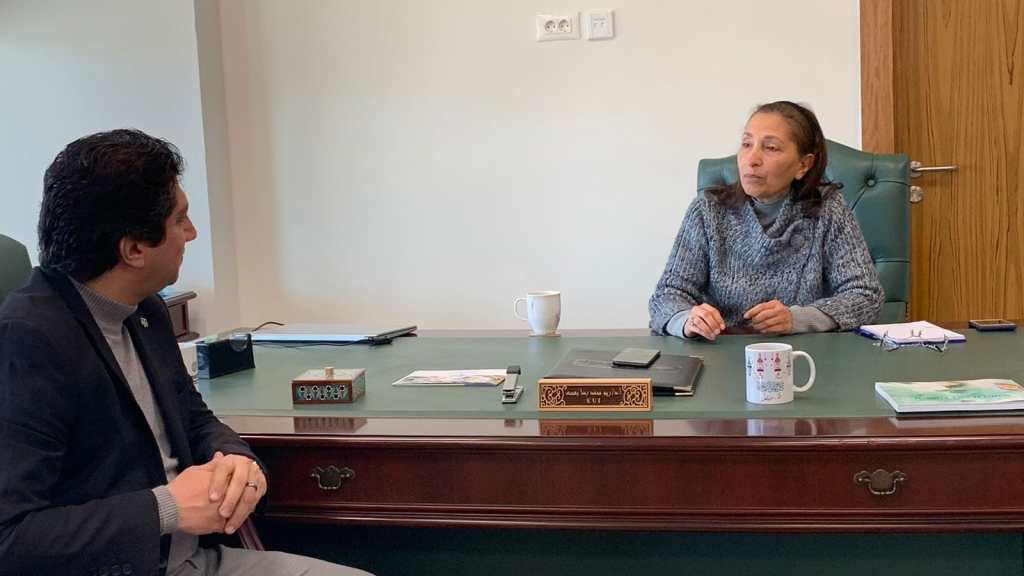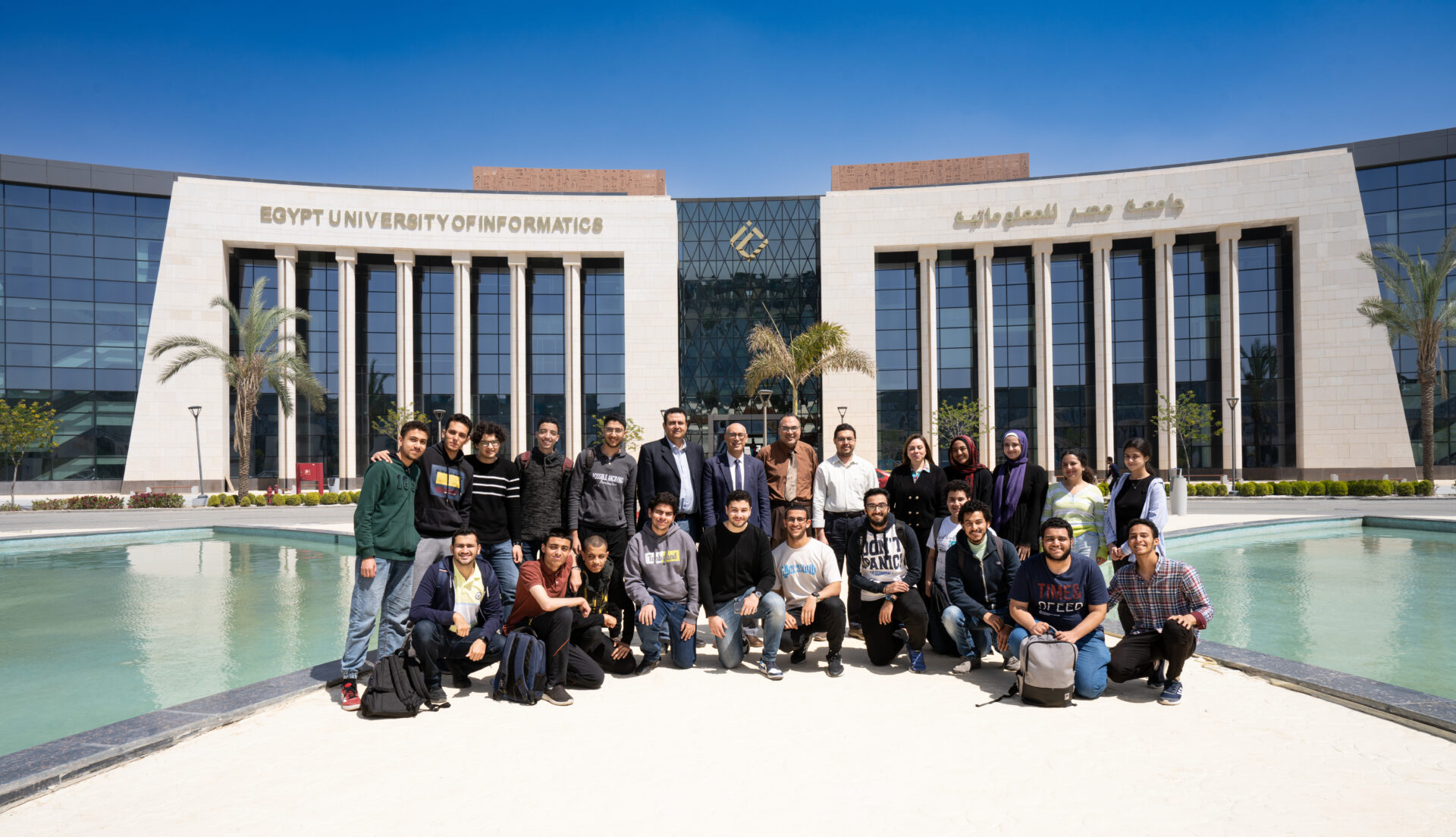
Egypt University of Informatics Seeks to Prepare New Cadres of Technology Leaders

As Arab higher education institutions strive to keep pace with the rapid growth in technological innovations, the Egypt University of Informatics (EUI) stands out as a private university specializing in information and communication technology in the Middle East and Africa.
Reem Bahgat , president of the university, seeks to link students to the local and international labor markets through programs and partnerships with international universities.
In an interview, Bahgat told Al -Fanar Media that the idea behind the university was to meet Egypt’s need for information and communication technology majors specialized in fields like artificial intelligence, cybersecurity, data science and engineering, electronics design, and networks.
These specialties are crucial for health and media sectors, Bahgat said, and the share of professionals in these areas in the labor market is growing remarkably in Egypt and worldwide. “Hence came the state’s interest in establishing a university specialized in those areas to graduate world-class cadres” of highly trained experts in these fields, she
added.
The university has four colleges: Engineering, Computing and Information Sciences, Business Informatics, and Digital Arts and Design. It was established by a decision of Egypt’s President Abdel Fattah El -Sisi in August 2021 as a nonprofit, private university. It is located outside Cairo in the Knowledge City, Egypt’s New Administrative Capital. The decree on establishing EUI indicates that the university aims to contribute to raising the education and scientific research standard and providing scientific majors to prepare specialists, technicians, and experts in various fields, in a way that links its goals to the needs of the advanced society, and the performance of research services for others.
To produce a new generation of world-class leaders in these fields, Bahgat said: “We studied the academic programs offered at prestigious international universities and put our programs in compliance with them, besides agreements with major international universities, such as Purdue University–West Lafayette , in the United States.”
Under the agreement with Purdue University, whose Engineering was ranked as one of the top five engineering schools in the United States in the 2023 rankings by US News & World Report, she noted EUI students could earn a dual degree with the American institution in computer engineering, electronics, and communications engineering.
The university also keeps pace with international laboratory standards at foreign partner universities so that students can have an experience similar to those studying abroad. In this regard, Bahgat noted the conclusion of an agreement with the University of Minnesota–Twin Cities , which ranked 34th in computer science in the 2023 US News rankings.
The Faculty of Computer Science at Egypt, the University of Informatics, also benefits from an agreement with the University of Ottawa’s Telfer School of Management . Other agreements are still under study. These agreements allow university students, if they take their senior year in partner universities, after matching their courses, to obtain a dual degree from their alma mater and the foreign university, said Bahgat.
Bahgat explained that Egypt’s Ministry of Communications and Information Technology, the founder and supporter of the university, aims to graduate world-class cadres to meet the needs of the labor market and attract foreign companies to invest in Egypt, thus activating the market in these areas.
The university is also working to connect students with the industrial sector. “We have signed agreements with prominent international and local IT companies, including Microsoft, Teradata, and IBM. Other companies are on the way,” said Bahgat. “This enhances the practical aspects of the university’s curricula, giving students access to the tools and platforms that these companies offer, in addition to field training.” The university’s location in the Knowledge City contributes to its success, Bahgat said, connecting it with institutions like the Ministry of Communications and Information Technology, the Information Technology Institute, the National Telecommunications Institute (NTI), and the National Academy for Persons with Disabilities, an applied research center.
“The university is cooperating with the Academy of Persons with Disabilities in providing applications, programs, and research that benefit this segment of society,” she added. “These institutions offer specialized training programs for university students and graduates, in cooperation with specialized companies in these fields, which helps students
benefit from practical training programs of these institutes.” The Knowledge City also hosts the headquarters of emerging and specialized companies, including five embedded systems companies and five electronics design companies.
The city’s second phase entails establishing four 14-story towers, where students can study theoretical courses while gaining practical experience through opportunities like an internship in a company or being part of a project team, Bahgat said.
Bahgat believes that graduating cadres of young experts with international specifications
requires students with exceptional standards. Egypt University of Informatics is supervised by the Ministry of Higher Education and Scientific Research, she said, and the ministry determines the minimum average for
university admission. The university considered the ministry’s standards in awarding grants of varying
amounts, up to full scholarships, to outstanding students, Bahgat said. “This improves the quality of our students and raises education standards that benefit all students.”
The university awarded 29 full scholarships in its first year and 21 full scholarships in the
current year. As for linking students to the labor market, Bahgat said the university’s courses include
soft skills, academic and theoretical knowledge, and practical experiences, focusing on entrepreneurship and creativity in some faculties.
“We also have a bachelor’s degree in entrepreneurship, creativity, and innovation at the
College of Business Technology,” said added. “We seek the help of professors specializing in teaching creativity and innovation, along with industrialists.”
Bahgat said the university realizes that some graduates want to form their businesses and are not interested in seeking a job in the market. So the university works to develop their skills and provide them with tools and additional extracurricular activities. They are offered vital English language programs and training in soft skills in some courses,
besides additional summer activities. Women comprise about 20 percent of the students, but Bahgat expects this percentage to increase in the coming years. “Our academic programs attract both young men and women, and both sexes have the opportunity to work in these fields because they are related to jobs that do not require specific physical abilities but mental strength, good training, knowledge, information, and skills,” she said. “When I was a computer science
student, I took those reasons into consideration to join this field.”
About her being chosen to lead a prestigious academic institution, Bahgat said that competence in an academic career is a crucial factor, regardless of gender. “We work hard. As a woman, I faced no difficulties in my academic career,” she said. “I believe that academia does not differentiate between men and women and needs people with diligence and vision, a good choice of the work team, future planning, and flexibility.” She added that women in higher education tend to have an advantage in their non- aggressive management style and “a way of solving problems that better suits the nature of relationships among academics and provides a comfortable and encouraging work environment.” What some women may lack, she said, is the ability to make decisions
without hesitation.
The deans of the university’s four faculties include two men and two women, Bahgat said, but those choices “were not based on gender-based quotas in senior management, but rather on previous work experience, a résumé, and interviews.”
The same standards apply to teaching assistants and administrators, she added. “We want to create a work environment that boosts cooperation and interdependence. We may differ in opinions, but we move forward together.”
She pointed to her glass-walled office: “We all see each other and move effectively to take any action. This increases familiarity and unity of purpose, which is helped by the relatively small number of students. With the completion of the university buildings and a surge in the number of students, things might change.”

